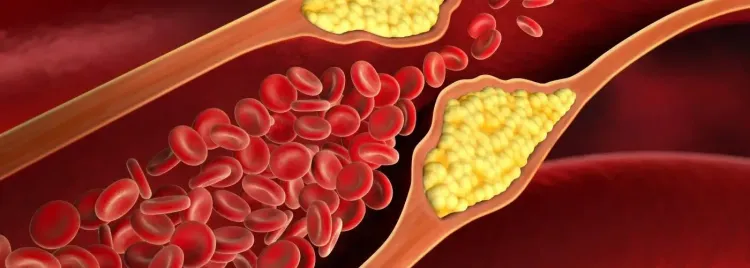Indian Researchers Create Innovative Optical Platform for Cholesterol Detection

Synopsis
Key Takeaways
- New cholesterol detection platform developed.
- Utilizes silk fiber and phosphorene quantum dots.
- High sensitivity and selectivity for cholesterol.
- Environmentally friendly with no e-waste.
- Can aid in early detection of serious health conditions.
New Delhi, April 23 (NationPress) A group of interdisciplinary scientists at the Institute of Advanced Study in Science and Technology (IASST) located in Guwahati, an autonomous body under the Department of Science and Technology (DST), has successfully developed an optical sensing platform designed for cholesterol detection, utilizing silk fiber that has been functionalized with phosphorene quantum dots, as announced on Wednesday.
This laboratory-scale point-of-care (POC) device is capable of detecting cholesterol in very low concentrations, even below the recommended levels. It has the potential to serve as an effective tool for routine monitoring of cholesterol levels in the human body.
The cholesterol detection platform can aid in recognizing early indicators of health issues such as atherosclerosis, venous thrombosis, cardiovascular diseases, heart disease, myocardial infarction, hypertension, and even cancer.
Led by Neelotpal Sen Sarma, a retired professor; Dr. Asis Bala, an Associate Professor; and Nasrin Sultana, a DST INSPIRE Senior Research Fellow, the team integrated silk fiber into a cellulose nitrate membrane to form an electrical sensing platform for cholesterol detection.
The developed sensors demonstrate high sensitivity and selectivity for cholesterol detection. Moreover, this electrical sensing platform is environmentally friendly as it generates no e-waste, presenting a significant advantage for the manufactured device.
Both sensing platforms exhibit similar responses to real-world samples, such as human blood serum, experimental rat blood serum, and milk. The findings have been published in the journal Nanoscale, which is released by the Royal Society of Chemistry.
Early detection of life-threatening diseases is crucial, as abnormal biochemical markers may accompany such conditions. Consequently, reliable point-of-care (POC) detection of biomarkers associated with these diseases is essential for personalized health monitoring.
Cholesterol, a vital lipid in humans, is synthesized by the liver. It serves as a precursor for vitamin D, bile acids, and steroid hormones. Cholesterol is necessary for animal tissues, blood, and nerve cells and is transported via blood in mammals.
There are two primary types of cholesterol: LDL (low-density lipoprotein), often labeled as 'bad' cholesterol due to its tendency to accumulate in arterial walls and contribute to severe diseases, and HDL (high-density lipoprotein), recognized as 'good' cholesterol.










